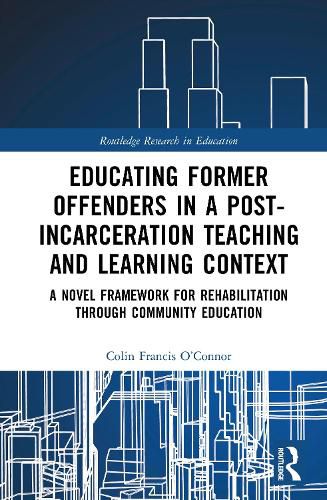Readings Newsletter
Become a Readings Member to make your shopping experience even easier.
Sign in or sign up for free!
You’re not far away from qualifying for FREE standard shipping within Australia
You’ve qualified for FREE standard shipping within Australia
The cart is loading…






This unique and insightful volume presents the findings of a four-year investigation into the learning experiences of former offenders and outlines a novel framework for guiding those affected by the judicial system towards pathways of hope and possibility through community education initiatives.
Following a four-year investigation documenting former offenders' learning experiences, the book examines subculture research, transformative learning paradigms, and desistance literature to support a more considered, collaborative, and applied approach to educating former offenders in a post-community context, building personal self-worth and positive societal change through community collaboration. Rooted in an autoethnographic methodology combined with first-hand experience and collaboration between the author and former offenders, the book explores the personal, wider social and political factors that influenced the research subjects' pathways towards crime and substance misuse. The book ultimately suggests alternative approaches to working with, and educating, non-traditional students in a post-release teaching and learning context.
Contributing to research into how best to support community reintegration, rehabilitation, and desistance through education, the book will be of interest to researchers, scholars, and postgraduate students involved with post-incarceration education, sociology of education, and non-formal education more broadly. Community Psychiatry and Rehabilitation scholars may also find the work of interest.
$9.00 standard shipping within Australia
FREE standard shipping within Australia for orders over $100.00
Express & International shipping calculated at checkout
Stock availability can be subject to change without notice. We recommend calling the shop or contacting our online team to check availability of low stock items. Please see our Shopping Online page for more details.
This unique and insightful volume presents the findings of a four-year investigation into the learning experiences of former offenders and outlines a novel framework for guiding those affected by the judicial system towards pathways of hope and possibility through community education initiatives.
Following a four-year investigation documenting former offenders' learning experiences, the book examines subculture research, transformative learning paradigms, and desistance literature to support a more considered, collaborative, and applied approach to educating former offenders in a post-community context, building personal self-worth and positive societal change through community collaboration. Rooted in an autoethnographic methodology combined with first-hand experience and collaboration between the author and former offenders, the book explores the personal, wider social and political factors that influenced the research subjects' pathways towards crime and substance misuse. The book ultimately suggests alternative approaches to working with, and educating, non-traditional students in a post-release teaching and learning context.
Contributing to research into how best to support community reintegration, rehabilitation, and desistance through education, the book will be of interest to researchers, scholars, and postgraduate students involved with post-incarceration education, sociology of education, and non-formal education more broadly. Community Psychiatry and Rehabilitation scholars may also find the work of interest.